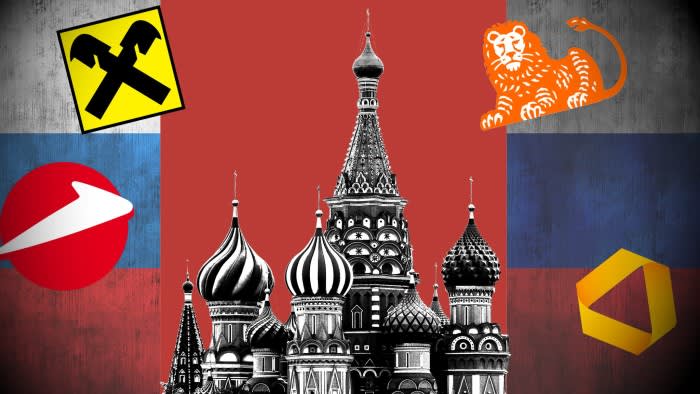how Carlsberg lost its Russian business
Almost two decades after stepping down as president of Russia’s largest brewer, businessman Taimuraz Bolloev is back in charge at Baltika and has set out to restore it to what he considers its 1990s heyday, before its acquisition by Denmark’s Carlsberg.
A friend of Vladimir Putin, Bolloev was appointed in July after Russia’s president placed Baltika under “temporary management”, a move leaving Carlsberg with title to the shares but no control of a business that had made up 10 per cent of its global revenues.
As Carlsberg reckons with the loss of its second-largest market, Bolloev and the company’s new management have ploughed ahead with plans to relaunch Baltika 3, a lager first brewed a year after the 1991 collapse of the Soviet Union that now bears Bolloev’s name on the bottle.
“My signature — as the author,” the elaborately mustachioed Bolloev declared on Russian state TV. The beer is being marketed as “free from foreign additives” and made from 100 per cent Russian ingredients, while its tagline reads: “The reborn taste of 1992.”
The saga of Carlsberg’s Baltika is a return to the 1990s in more ways than one: the Kremlin’s moves to reward loyalists with seized western assets could constitute the biggest shift of wealth since the birth of the oligarchy in the early days of Russian capitalism.
In a bid to leave the Russian market following the invasion of Ukraine, Carlsberg had reached a deal to sell the brewer to Arnest, a leading Russian manufacturer of metal packaging and aerosols. But this summer those plans were overturned.
Baltika, whose profits doubled to Rbs10bn ($109mn) last year, made sense for seizure, according to a person involved in government discussions on the issue.
“It had been on the market for ages, it makes a lot of money, it’s a lot more profitable than the number two brewery, Heineken. That meant there was blood in the water” as powerful individuals lined up for Baltika, the person said. “People say to Putin, ‘hey, you should give me this asset’.”
The moves against Carlsberg and Danone, whose Russian business was also put under temporary administration this summer, came days after Poland froze a Russian billionaire’s stake in a Polish fertiliser company. The Kremlin has previously attributed its decision to seize the Russian power plant assets of Germany’s Uniper and Finland’s Fortum as a response to “unfriendly countries” seizing Russian assets abroad.
Dmitry Peskov, Putin’s spokesman, did not respond to a request for comment. Peskov said last week that Russia would not allow a “free exit” for western companies, which were subject to a “special regime” because of the “quasi-war waged by the collective west against Russia”.
The Baltika decision came as a shock to officials in charge of approving Russian exits, who were on the verge of signing off on the sale to Arnest. Another person involved in a series of western exit deals described it as “a snap decision made in a couple of days”.
It has also spooked western companies still attempting to leave Russia, which are scrambling to fully understand the motivations behind the seizures and work out which companies might be next.
“We have this risk [with our own business] but we can’t do anything about it . . . If we think about it [too hard] we really can’t continue operations,” said an executive working at one major food and beverage company in the country. “So we’ve consciously decided to not take it into account.”

The trick, according to a person involved with some of the biggest US corporate exits from Russia, is to make sure your chosen buyer has enough internal Russian political capital “to keep the wolves at bay” and to race to get the sale done as quickly as possible.
“If you slow that process down,” he said, “you give the rent-seeking expropriators more time to find a way to try to get the asset”.
Bolloev is reportedly close to billionaires Yuri and Mikhail Kovalchuk, who are among Putin’s confidants and had previously signalled their interest in Baltika, which is based in their native St Petersburg, according to two people familiar with the matter.
Bolloev, who unlike the Kovalchuks is not under western sanctions, was initially reluctant to get involved for fear that this could change, the person involved in the government discussions on Baltika said, and tried to negotiate a purchase of Baltika with Carlsberg.
But the Danish brewer, after deeming Bolloev’s terms “unacceptable”, last month wrote down the value of the business and moved to terminate the agreements that allowed Baltika to sell Carlsberg’s international brands including Tuborg and Kronenbourg 1664 in Russia.
Now Bolloev — a direct, straight-talking manager who ran Baltika from 1991 to 2004 “as an empire”, according to one former Carlsberg executive — has re-exerted swift control over the company.
Russian chief executive Denis Sherstennikov, who was appointed by Carlsberg in 2021, has left Baltika, according to a person with direct knowledge of his situation, while Bolloev has rehired his former right-hand man, supply chain expert Alexander Dedegkaev, to run operations.

With Carlsberg stripped of the ability to vote with its shares, Baltika’s new management “can do whatever they like: sign contracts, set the prices they want and buy side companies”, said the former executive who ran Carlsberg divisions in eastern Europe.
Bolloev and Dedegkaev have also pledged to bring back regional beer varieties that Carlsberg trimmed and make all Baltika’s beer from Russian hops — a challenge given that, until now, the Russian beer industry has imported 95 per cent of its hops from Europe and the US.
Meanwhile, Russia’s brewing sector hopes Bolloev, with his ties to the Kremlin, will be able to lobby successfully for easing regulation that has stymied industry growth.
When Carlsberg took full control of Baltika in 2008, the country made up 40 per cent of the group’s profits but lost market share as more foreign brewers arrived. Beer sales in Russia were also hit by new rules restricting where it could be bought, consumed and advertised, with conditions worsening further after 2014 when western sanctions were imposed following Russia’s annexation of Crimea.
Many Baltika employees who have worked at the company since Bolloev’s time are pleased to have the brewer’s beloved founder back at the helm, according to two former Carlsberg executives with knowledge of the matter. Senior executives had always resented interference from Copenhagen, they said, questioning whether Carlsberg had ever managed to exert full control over its largest subsidiary.
“They didn’t resent the ownership so much as they resented that Carlsberg is trying to tell them how to work, when they know better,” said a former senior Carlsberg executive who held a prominent role at Baltika in the late 2000s. “Who are these Danish guys telling them how to do their job?”
Evgeny Shevchenko, former vice-president of sales at Baltika and managing director of Carlsberg Ukraine, said: “Carlsberg culture was never a significant part of Baltika culture” during his time there.
However, a Carlsberg spokesperson said Baltika had become “a fully integrated part of the Carlsberg Group up until the decision to sell the business last year”, adding that the Russian business’s 8,400 employees were “part of the Carlsberg family” and that staff satisfaction scores were consistently high.
Having written off the entire value of the business, Carlsberg’s way forward after two decades in the unruly Russian market is uncertain.
The company’s newly appointed chief executive Jacob Aarup-Andersen has insisted that Russia “stole” the business.
However, as the Russian finance ministry has been keen to clarify, the seizure of Carlsberg falls short of a full nationalisation. This leaves a door open for Moscow to transfer ownership, or to extend the temporary management period and keep companies in limbo — and potentially use the assets as a bargaining tool should there be more seizures of Russian assets in the west.
Aarup-Andersen does not rule out a return to Russia under different circumstances.
“If the situation changes, if there is regime change, we will have a look at what the situation looks like,” he told the Financial Times last week, but added: “I think that is unfortunately a relatively remote scenario we are talking about.”
Reflecting on the company’s two decades in Russia, he said Carlsberg had entered the Russian market with the best of intentions, noting that when the acquisition was made, there was a strong business case and companies and countries were being encouraged to invest in Russia.
“With hindsight, the way things developed, of course, it turned out to be the wrong allocation of capital.”
Source link






